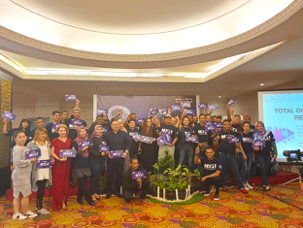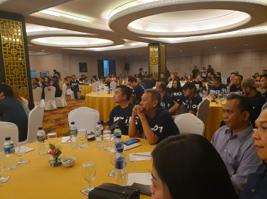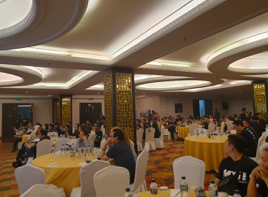Business
MX CURRENCY : Max Capital Group Launched Their First Private Currency in a bid to Shake Up Global Finance

The private currency will not just let billions of users make transactions but is already facing opposition from traditional FIAT money and cryptocurrency.
As of now, Max Capital Group LTD has announced a private currency called MX Currency that will help billion of users to make financial transaction around the world, to dramatically shake up the cryptocurrency market without shaking up the world’s banking system.
MX currency is being touted to connect people who don’t have access to traditional banking platform. This currency could be a financial game-changer to advance any controversy between existing traditional currency and cryptocurrency.
The introduction of MX Currency could also be a welcoming step for Maxone Technology’s profits. Expert analysts are suggesting MX currency could be a huge moneymaker for Max Capital Group LTD, to make more innovative financial technology software.
The UK lawmakers were also quick to raise privacy concern about the new private currency. Shortly after the Max Capital Group’s announcement in the first Global Founders’ Meeting held in Merylinn Park Hotel Jakarta, Indonesia, at 12-13 July 2019, called Charlotte Van Dorothy as the director from Max Capital Group to review the collaboration with Congress and regulators. She also called on maxone technology company executives to testify before the committee.
Max Capital Group Company has billions of assets to manage people’s money and it has repeatedly shown, with the announcement, that it plans to create the private currency. Max Capital Group is continuing its automation robot trading technology and extending its reach into the commodity market with one of the biggest trading platform software, Metatrader MT4.
The technology to make transactions with MX currency, thanks to MT4 trading platform, nowadays Metatrader is available as a standalone app – as well as the most secure trading platform in the market. Developed by MetaQuotes Software since 2005, it allows making a transaction for foreign exchange brokers who provide the software to their clients. It also allows customers to make trading for commodities, in MT5 trading platform
With the company in the crosshairs over multiple country expansion from all south Asia, this move is already attracting security from financial regulators and privacy advocates across the world. The Max Capital Group is also facing a potential first market clash with bitcoin, which stands as the strongest crypto commodity in the market, first reported by Guardian and Observer.
The UK officials have previously expressed concern about Max Capital Group’s move into the financial sector. In July, members of the UK Senate committee on banking, housing, and urban affairs wrote to Mr. Dody, one of the leaders from Maxone Technology, asking him to answer questions on the technology system, privacy concerns, and financial regulation
“It is extremely important to learn more about the amount of data the currency exchange market make available that can be used in ways that have a big impact for consumers financial lives,” the letter said. “It is also important to understand how big will be the impact of the global financial movement on profile and target consumers for using the financial data.”
Max Capital Group Executive claims the MX Currency and MT4 trading platform will help many millions of people without bank accounts, with access to mobile phones to enter the trading platform and open the mx1 wallet system enabled with mx1 technology to enter the banking world in order to send money in a more seamless manner. The company is likely to announce mx1 robot trading which would help people to invest their money using mx1 currency.
While Max Capital Group created the currency, decisions regarding the ongoing maintenance of MX1 and Metatrader trading platform will be carried out by leaders from Maxone Association, lead by Dody, a collective of dozens of financial, not-for-profit companies, and from commerce firms. To join the new Max Capital subsidiary platform, each of these companies contributed a minimum of £ 10M to venture, giving the company more than £ 1bn to put towards the new private currency.
The future companies that will involve include Mastercard, PayPal, the crypto exchange coinbase, and Amazon. Also joining the Maxone Association are the big-comers startups like Uber and non-profit financial organizations such as Microloan platform, a humanitarian aid group. The foundation will be headquartered in London, and Max Capital claims it will be independent of governments to grow, and to launch its first global founder meeting in South East Asia, starting from Indonesia, Laos, Vietnam, Thailand, Singapore, Myanmar, and goes to Nepal, Japan. Many Global founders meeting will be held in such countries twice each year.
In a document outlining how the new private currency will work, Max Capital Group said its goal is to foster more access to “cheaper, faster, better, and flexible financial services”. Unlike bitcoin, Ethereum, and any other cryptocurrencies, MX1 technology is tied to mix global assets like property, to prevent the level of volatility common in digital currency space. Max Capital Group also built the currency on its own technology, tied to a common currency in the market, and commodities in the global market.
Traditionally compared with cryptocurrency, the network can be run and secured by anyone with a mobile and computer access. Then, initially, the MX1 blockchain system will be closed, and only a selected number of people will able to run the software that powers it and verify the transaction.
The company


The company has been quietly padding its staff and crypto experts for years, and it has started to threaten potentially upset traditional banking institutions. Max Capital Group claims that it aims to supplement existing institutions and give freedom for the user to have access to mobile devices citing its partnership with any world banking institution and other nonprofit company.
“These kinds of groups will help us improve the next revolution of financial inclusion. For the long term, this project will be seen as a financial utility,” said Charlotte Van Dorothy, director of Max Capital Group. “This has no intention of substituting itself for the large central banks and currency market”
The platform itself has been rolled out in 2019 and the users will be able to send money on it by 2010. Private currency advocates say a company as large as Max Capital Group, will be in huge gain for the adoption of the crypto technology. Bitcoin already entered the world more than 10 years ago, but very few people use it on a daily basis.
The company has to face a number of potential regulatory private exchanges before it reaches consumers worldwide. In April 2019, Charlotte met the bank of England Governor, Mark Carney, and the US treasury to discuss later the payment system and how to make a new regulation in the future.
The company claims they will not attempt to bypass any existing regulation, instead will focus on “redefining” or innovation of the regulatory fronts. MX Currency will use the same technology, verification, and anti-fraud processes that banks and credit cards use and will implement automated systems to detect fraud, Max Capital Group said in its launch in the first founder global meeting.
Max Capital Group claims financial transactions will remain siloed from any crypto exchange and currency trade activity, and that user ad profile will not be based on habits.
Business
Inside the $4.3B Quarter: What’s Fueling Black Banx’s Record Revenues

Every quarter brings fresh headlines in fintech, but few make the kind of impact achieved by Black Banx in Q2 2025. The Toronto-based global digital banking group, founded by Michael Gastauer, reported an extraordinary USD 4.3 billion in revenue and a record USD 1.6 billion in pre-tax profit, while improving its cost-to-income ratio to 63%.
These results not only highlight the company’s operational efficiency but also mark a pivotal moment in its journey from challenger to global leader. The big question is: what’s fueling such impressive financial performance?
Customer Growth as the Core Driver
One of the clearest engines of revenue growth is Black Banx’s expanding customer base. By Q2 2025, the platform had reached 84 million clients worldwide, up from 69 million at the end of 2024. This 15 million net gain in six months demonstrates both the attractiveness of its services and the scalability of its model.
Unlike traditional banks, which rely heavily on branch expansion, Black Banx leverages digital-first onboarding that allows customers to open accounts within minutes using just a smartphone. This approach is especially effective in regions underserved by legacy institutions, where access to affordable financial tools is in high demand.
More customers don’t just mean higher transaction volumes—they generate a compounding effect where network size, brand trust, and service adoption reinforce one another.
Real-Time Payments and Cross-Border Solutions
A major contributor to Q2 revenues is the platform’s real-time payments infrastructure. Black Banx enables instant cross-border transfers across its 28 supported fiat currencies and multiple cryptocurrencies, helping both individuals and businesses bypass the traditional bottlenecks of international banking.
For freelancers, SMEs, and multinational clients, this means faster liquidity, reduced foreign exchange costs, and simplified global operations. The demand for real-time financial services is growing rapidly—Juniper Research projects global real-time payments turnover to hit USD 58 trillion by 2028—and Black Banx is strategically positioned to capture a significant share of this market.
Crypto Integration as a Revenue Stream
Another key revenue driver is crypto integration. While many traditional institutions remain hesitant, Black Banx embraced digital assets early and has built infrastructure to support Bitcoin, Ethereum, and the Lightning Network. In Q2 2025, 20% of all transactions on the platform were crypto-based, reflecting strong customer appetite for hybrid banking services that bridge fiat and digital assets.
Revenue comes not only from transaction fees but also from value-added services like crypto-to-fiat conversion, staking yields (4–12% APY), and blockchain-enabled payments. For customers in markets with unstable currencies, these services act as a financial lifeline, further expanding the platform’s relevance.
AI-Powered Efficiency and Risk Management
Record revenues would be less impressive if costs ballooned at the same rate. But Black Banx has proven adept at balancing growth with efficiency. Its cost-to-income ratio improved to 63% in Q2, down from 69% a year earlier, thanks to heavy reliance on AI-powered automation.
AI now drives fraud detection, compliance, and customer onboarding—areas where traditional banks often struggle with cost inefficiencies. By automating these processes, Black Banx can process millions of transactions securely while maintaining profitability at scale. This level of efficiency is rare in fintech, where high growth often comes at the expense of margins.
Regional Expansion and Untapped Markets
Geography also plays a role in fueling revenues. Much of the Q2 growth came from Africa, South Asia, and Latin America—regions where demand for mobile-first banking continues to soar. In 2024 alone, Black Banx reported a 32% increase in SME clients from the Middle East and Africa, signaling the strength of its positioning in underserved markets.
By extending services to populations previously excluded from formal banking—migrant workers, rural communities, and small businesses—Black Banx taps into vast pools of latent demand. The strategy proves that financial inclusion and profitability are not mutually exclusive but mutually reinforcing.
Diversified Revenue Streams
Another factor behind Q2’s record revenues is Black Banx’s diversified business model. Income is not tied to a single service but spread across multiple streams, including:
- Transaction fees from cross-border transfers and payments.
- Crypto trading and exchange services.
- Premium account features for high-net-worth clients.
- Corporate services for SMEs and international businesses.
This diversification insulates the company against volatility in any single segment, creating stable revenue growth even in shifting market conditions.
Michael Gastauer’s Strategic Blueprint
Behind these results is Michael Gastauer’s long-term strategy: scale aggressively but with efficiency, innovation, and inclusion at the core. His vision has always been to create a borderless financial ecosystem, and Q2 2025’s performance is evidence that this vision is not only achievable but sustainable.
By balancing mass-market accessibility with premium features, and by blending fiat with digital assets, Gastauer has positioned Black Banx as a category-defining player in global finance.
The Road Ahead: Toward 100 Million Clients
Looking forward, the company’s goal of reaching 100 million customers by the end of 2025 will likely be the next catalyst for revenue growth. More customers mean more transactions, more data insights, and more opportunities to refine and expand its service offering.
If current momentum holds, the USD 4.3 billion quarterly revenue milestone could be just the beginning of an even larger growth story. The challenge will be ensuring systems scale securely while maintaining trust in an environment where privacy and compliance are paramount.
A Record That Signals More to Come
Black Banx’s Q2 2025 performance—USD 4.3 billion in revenue, USD 1.6 billion in pre-tax profit, 84 million clients worldwide, and a lean 63% cost-to-income ratio—is more than a financial milestone. It is a signal of how the future of banking is being rewritten by platforms that are borderless, crypto-inclusive, and data-driven.
What fueled this record-breaking quarter is not one innovation but a combination of strategies—scalable onboarding, real-time payments, crypto integration, AI efficiency, and expansion into underserved regions. Together, they form a model that doesn’t just challenge traditional banking but actively builds the foundation for global dominance.
For Black Banx, the road ahead is clear: the $4.3 billion quarter is not an endpoint but a launchpad for even greater scale and profitability.
-

 Tech5 years ago
Tech5 years agoEffuel Reviews (2021) – Effuel ECO OBD2 Saves Fuel, and Reduce Gas Cost? Effuel Customer Reviews
-

 Tech6 years ago
Tech6 years agoBosch Power Tools India Launches ‘Cordless Matlab Bosch’ Campaign to Demonstrate the Power of Cordless
-

 Lifestyle7 years ago
Lifestyle7 years agoCatholic Cases App brings Church’s Moral Teachings to Androids and iPhones
-

 Lifestyle5 years ago
Lifestyle5 years agoEast Side Hype x Billionaire Boys Club. Hottest New Streetwear Releases in Utah.
-

 Tech7 years ago
Tech7 years agoCloud Buyers & Investors to Profit in the Future
-

 Lifestyle5 years ago
Lifestyle5 years agoThe Midas of Cosmetic Dermatology: Dr. Simon Ourian
-

 Health7 years ago
Health7 years agoCBDistillery Review: Is it a scam?
-

 Entertainment7 years ago
Entertainment7 years agoAvengers Endgame now Available on 123Movies for Download & Streaming for Free
